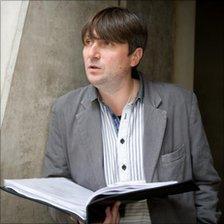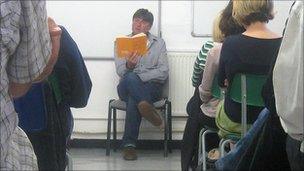Simon Armitage puts poetry into motion in Yorkshire
- Published

Simon Armitage has recently been made a CBE. Photo: Jonty Wilde
Knackered after walking 200-odd miles, his reddened face lacquered by 15 days in the sun, wind and rain, poet Simon Armitage is supping a satisfying pint of bitter in an 18th Century hunting lodge in the Yorkshire Dales.
Armitage is walking the 264-mile Pennine Way. He started with no money and is instead staging nightly poetry readings in halls, houses and pubs en route in return for donations, accommodation and food.
He is singing for his supper - following the gruelling and sometimes risky route as a modern-day troubadour in an attempt to make his poetry pay.
At the lodge - a grand, remote building that is now a study centre - more than 50 people gather in a classroom to watch him read from a stack of his books.
"I'm sorry if you can't see at the back," he tells them after the day's 14-mile trek. "I normally stand up, but under the circumstances I'm sitting down."
At the back are GCSE students on a geography field trip, who are likely to be studying Armitage in their English lessons - he has been on the curriculum for a decade. Some are deep in concentration when he reads; others look bored stiff.
As well as being a homework staple, Armitage has recently been made a CBE for services to literature, perhaps a consolation for narrowly missing out on becoming poet laureate last year.

Armitage asked for donations after his readings
In any case, he is one of Britain's best-loved and most accessible poets, and entertains the audience with witty, vivid and poignant verses and anecdotes.
He then produces a sock - clean, he assures us - into which admirers are invited to stuff donations on their way out.
Sitting in the centre's fusty sitting room after the gig, he says the journey was inspired in part by the ancient poets who toured the countryside in the days before the printing press.
"There would have been a time when the important thing to do was to stand up in front of people," he explains. "And I still see that as part and parcel of my task, even though I disseminate my work through books.
"I like the idea that I've got to be accountable for that work on occasion, and that I've got to stand up in front of strangers and make them work in that context."
He continues: "I'm interested in the idea of whether poetry is a currency that will travel - the poems that I write, will they work in Bellingham and Kirk Yetholm and Byrness to audiences of, say, hikers or schoolkids on a geography field trip?"
'Intimate' readings
With his journey ending in Edale, Derbyshire, on Monday, the answer seems to be yes.
At a walkers' hostel one night, two or three people turned up to see him read, but the audience was otherwise made up of unsuspecting hikers.
"Essentially it was the people who by coincidence were staying there that night. I was reading to them whether they liked it or not," he says.
"That turned out to be one of the nicest nights. It was intimate, personal, and we sat there in the residents' lounge and it developed into a chat."
Another night, he competed with a pool table for regulars' attention at a rural Northumberland pub.
"They're interesting, those evenings, because you have to work quite hard," he reflects. "I always think the measure of success is whether you manage to bring the pub to a kind of quietness. You know, when you look up at the end, people are listening.
"That's what happened that night in the pub and I felt quite confident, I think, from that moment on."
The actual walk between readings, meanwhile, has been less forgiving.
"It's not for the faint-hearted, of which I am one," he chuckles. "I got lost on Cross Fell, which was really horrible. It was foggy. It's undescribably bleak up there when you don't know what you're doing or where you are.
"I had a GPS unit with me, which I didn't think I would use but I did have to get it out a few times and walk with a compass in my hand.
"It was like being in that Antony Gormley cube which was full of mist. It was very disconcerting and I was very glad to get out of that."
But a meal and bed have been waiting for him at every stop, courtesy of local residents and groups who have put him up along the way.
"Occasionally people have met me on the track with flasks and butties," he says.
The poet and author was "really delightful", according to Ann Pilling, who hosted a reading in her home in Wensleydale before giving him a room for the night.
"I think in my drawing room we had about 50 people, with people sitting on the stairs and on the floor, and he was absolutely brilliant," says Mrs Pilling, herself an established writer most famous for the children's book Henry's Leg.
"I borrowed some chairs from my church. Somebody brought them up in a tractor. He was very, very eloquent and articulate and interesting. His poetry is very accessible, but it's subtle and it has real punch, you know?"
Book plan
The people Armitage has met along the way, along with stories about the land and recollections from his childhood, will make their way into a book about the journey.
"I think it might even be a little bit of a guide book - but not 'turn left at this sign,'" he says.
Has he managed to successfully live off his wits and words? "I've had enough to get by and people have been so kind," he replies.
"At the end I'm going to draw up a balance sheet and try to work out what's gone out and what's come in, and I'm aiming to break even."
- Published12 June 2010